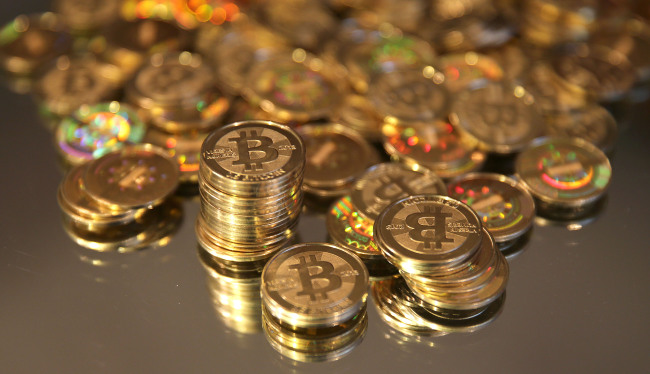[Weekender] Bitcoin designed to shake central bank-driven frame
By KH디지털2Published : Aug. 28, 2015 - 18:12
A virtual currency is shifting the idea of a centralized, corporeal currency while debates -- with their pros and cons -- on its safety and efficacy matters are underway.
Bitcoin is a digital currency that was created in 2009 by an individual or group called Satoshi Nakamoto, whose identity is still unknown.
One of bitcoin’s biggest features is that it is decentralized -- not managed by typical monetary policymakers including central banks and finance ministries.
Instead, it is managed by groups or individuals who work as bitcoin miners, who earn (“mine”) bitcoins by running specialized computers that solve mathematical problems.

Users can use bitcoins by installing a bitcoin wallet on their computer or other device and send bitcoins to each other’s wallet addresses like sending an email. Users can create as many bitcoin wallets as they want.
Every bitcoin transaction gets recorded on a publically recorded ledger called a “block chain,” and miners verify each transaction and receive bitcoins for their work.
Because it is decentralized, bitcoin has the advantages of having low fees and can be used anywhere in the world with minimal hassle. It can also be converted into tangible currencies -- the won, dollar, euro, yuan, yen, peso, ruble and real -- through bitcoin exchanges.
However, bitcoin is not without controversy. While some believe being a decentralized currency makes bitcoin free of monetary policies imposed by banks or governments, bitcoin’s anonymity also lends itself to use in criminal activity.
A notable example is Silk Road, a now-defunct online black market for drugs and other items that made payments entirely with bitcoins due to the anonymity the currency offered.
Additionally, bitcoin’s value tends to fluctuate wildly compared to other centralized currencies, as it is dependent on how much people are willing to pay for them.
Bitcoin usage is still uncommon in South Korea compared to Europe and North America, but has slowly been increasing over the past few years.
Korea saw its first bitcoin exchange website Korbit in 2013, and an ATM that buys and sells bitcoins was installed at the COEX mall in southern Seoul in 2014.
A Paris Baguette store in Incheon City Hall became one of the first stores to accept bitcoin as transaction in 2013, and now a few locations in other tourist areas also accept bitcoins.
Bitcoin Center Korea, an education and bitcoin exchange center, also opened in Seoul in February and strives to educate and raise public awareness about bitcoin.
Meanwhile, the Bank of Korea released a statement in 2013 and announced while they would not ban bitcoin, they do not have particular plans to support it.
“Bitcoin has the advantage of being efficient in transaction, but due to weak security, wildly fluctuating value and limited quantity, it is unclear whether it would grow as an alternative currency,” the statement read.
Although the potential of bitcoin and its future is yet unclear, it is still worthy of attention in that it has brought a completely new paradigm in currency.
By Sang Youn-joo (sangyj@heraldcorp.com)








![[Hello India] Hyundai Motor vows to boost 'clean mobility' in India](http://res.heraldm.com/phpwas/restmb_idxmake.php?idx=644&simg=/content/image/2024/04/25/20240425050672_0.jpg&u=)









